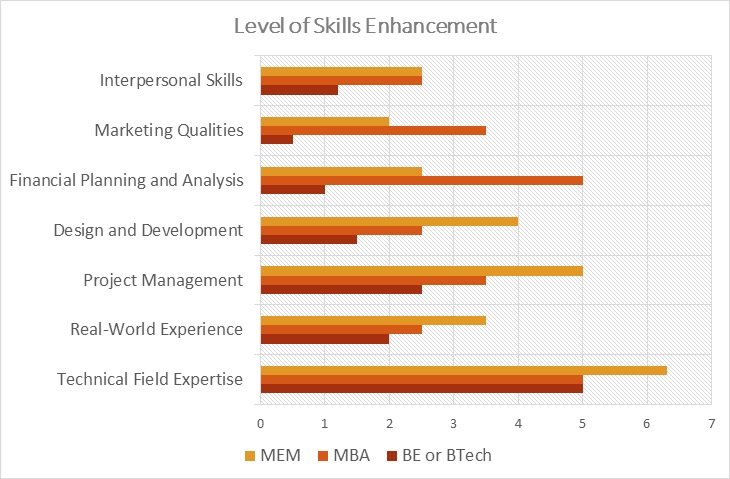MEM vs MBA – Differences and Similarities
MEM vs MBA – Differences and Similarities: Master of Business Administration (MBA) and Masters in Engineering Management (MEM) are two of the most sought-after courses among international students looking forward to study abroad. However, students often get confused when it comes to choosing one of the courses. In this article, we have compared both the courses on the basis of certain parameters, which will help you make an informed decision.

There is a minor difference between MEM and MBA to specialize in the managerial profile. As per the name, the Master of Engineering Management or MEM is designed explicitly for those belonging to an engineering background. In comparison, any graduate with any discipline can pursue a Master of Business Administration or MBA program. MEM program focuses on operations, accounting, leadership, finance, etc., and an MBA program focuses on leadership, business administration, and marketing aspect. Comparing a Master of Engineering Management (MEM) and a Master of Business Administration (MBA) can be difficult. Both MBA and MEM are management degrees designed to brief you about your expertise. Continue with this article to learn more about the major differences between MEM and MBA.
MBA vs MEM Highlights
The table given below provides a comparison between MBA and MEM programmes offered at foreign universities. The table includes various parameters such as the eligibility criteria, top universities, curriculum, etc. In addition, it also includes the details of MEM vs MBA salary, which is Rs. 72 lakhs and Rs. 62 lakhs per annum on average (individual placement reports might differ):
Predict your IELTS, TOEFL, and PTE in just 4 steps!
| Parameters |
MEM |
MBA |
|---|---|---|
| Eligibility Criteria for applicants |
Bachelor’s degree in any discipline |
|
| Top Universities |
||
| Core Curriculum |
|
|
| Program Electives |
Restricted to all the possible fields of Engineering and Technology |
Cover all the possible industries and fields ranging from Engineering, Marketing, Entrepreneurship, Human Resources, etc. |
| Type of Knowledge Gained |
Technical and Management |
Non-Technical and Management |
| Skills acquired post-completion of the program |
Transforms professionals into Tech-Savvy Leaders for data-driven decision-making and growth perfectly fitting the requirements of high-tech companies |
Transforms professionals into all-rounders having core business and marketing competencies that are applicable, in fact, desirable for leaders in every organization |
| Duration |
12-15 months |
24 months |
| Overall Average Cost |
INR 33.71–46.68 lakh including tuition fee, course material, and meals |
INR 51.87–72.62 lakh includes tuition only, no course material or meals |
| Industries relevant to employment |
|
|
| MBA vs MEM salary |
INR 72.62 lakh |
INR 62.25 lakh |
MEM vs MBA: Target Skills
The chart below will help you understand the level of skills you possess after completing your bachelor’s degree in Engineering or Technology, and the level of skills you would gain through an MBA or MEM:

How to Choose Between MEM and MBA
If you are choosing between an MBA (Master of Business Administration) and a MEM (Master of Engineering Management), here are a few factors to consider:
- Career Goals: Take into account your long-term career goals while deciding between MBA vs MEM. While MEMs are more suited for people wishing to work in engineering or technical management positions, MBAs are frequently better suited for people looking to go into management.
- Curriculum: Examine each programme's course offerings and decide which best suits your interests. While MBAs may provide a wider variety of business and management courses, some MEM programmes may include courses that are more technical or scientific in character.
- Course Length: Programme length and course schedules are additional factors you should take into account. Some MBA programmes may provide evening or part-time options, making them more practical if you work a full-time job, while some MEM programmes may be shorter than MBA programmes.
- Rankings and Placements: You should also take into account the standings, reputation, and placements of the programmes you are considering. Look for accredited institutions with a proven track record of accomplishment.
These are a few things to be kept in mind if you have a clear professional goal before choosing an MBA over MEM. For more guidance, you may contact our experts here.
Also Read
| Canada Student Guide | USA Student Guide |
| UK Student Guide | Australia Student Guide |
MBA vs MEM FAQs
Q. Which is better MBA or MEM?
A. MBA and MEM are master’s degrees available for students after graduation. MBA is for business management and MEM is for engineering management. Both degrees are globally recognized therefore it is on you and your educational background. In the end, it comes down to personal criteria including skill sets, hobbies, and professional ambitions. While certain businesses may appreciate a MEM more than an MBA, others may prefer an MBA. It's crucial to thoroughly weigh both possibilities and select the one that best suits your interests and career ambitions.
Q. Can I study MBA after MEM?
A. Yes, it is possible to study for MBA after MEM but vice-versa not the same. Graduates from any discipline can pursue a Master of Business Administration. However, for MEM, students must have the technical knowledge or a degree in engineering. Any graduate from any field can pursue an MBA, and many universities may have special programmes for those with technical backgrounds who want to work in management. The decision to pursue an MBA after receiving a MEM will ultimately be based on the person's interests, professional objectives, and other criteria.
Q. What are the MEM vs MBA salary details?
A. The salary details for MEM and MBA graduates can vary depending on a variety of factors, including the industry, location, job title, and level of experience. The average starting salary for both MEM and MBA graduates is similar, but there tends to be more variation in earning potential for MBA graduates over the long term. Here are some more specific details:
- MEM Salary: Depending on where they work, MEM graduates make a range of salaries, but on average, they make between $85,000 and $110,000 annually. Engineering, technology, and consulting are some of the sectors with the highest salaries for MEM graduates.
- MBA Salary: The annual salary for MBA graduates varies from $80,000 to $120,000 based on the sector, position, and location. The highest-paid MBA graduates make upwards of $300,000 annually, and experienced MBA graduates may potentially make more.
Q. Which are the top countries for MEM and MBA?
A. The United States of America, Canada, the United Kingdom, Australia, Singapore, and Germany are some of the top countries for pursuing MEM and MBA abroad. It is important to keep in mind that these rankings could change based on the source and standards utilised to assess the programmes. Furthermore, these rankings may not cover all of the nations that provide top-notch MEM and MBA programmes. Regardless of the nation in which they are based, students who are interested in pursuing a MEM or MBA programme should thoroughly investigate the programmes and institutions that match their career goals and interests.
Q. What is the scope of engineering management?
A. Engineering Management sees the application of managerial practice to the discipline of engineering. Engineering Management sees the application of managerial practice to the discipline of engineering. This career will involve learning engineering's technical and problem-solving practical understanding of the administrative planning of business management. In order to design and manage complex systems and processes, engineering management encompasses a very wide range of technical and business knowledge. For individuals with the required knowledge and abilities, there are numerous job options in the industry, which is in high demand.

Priya Garg is a seasoned content writer and editor. With her rich experience in content writing, teaching and research & analysis, Priya believes in providing only the correct information which is also up-to-date. H... Read Full Bio
